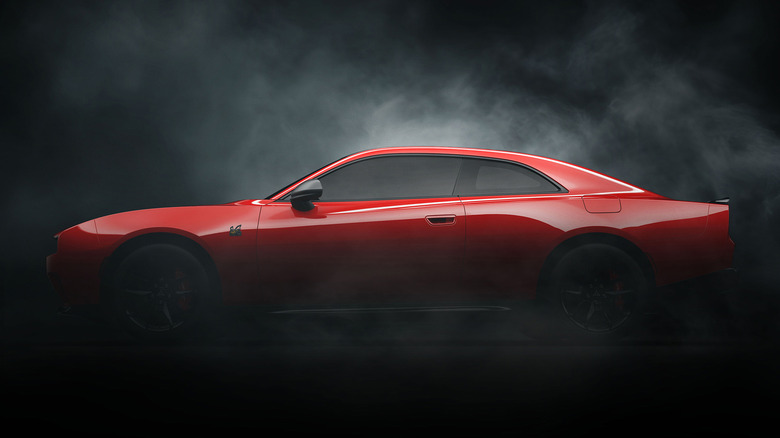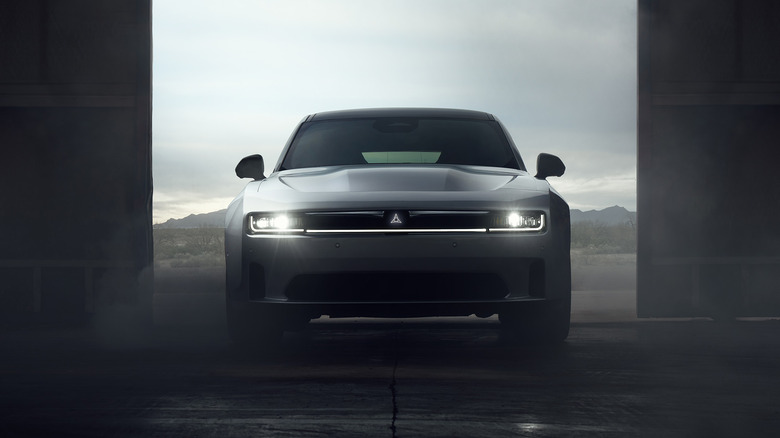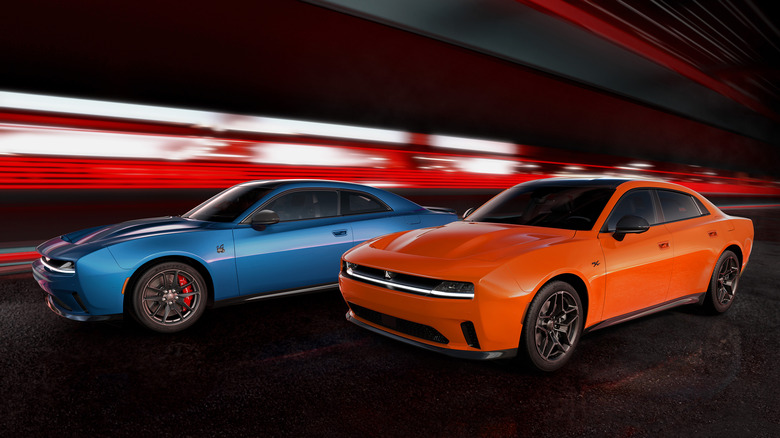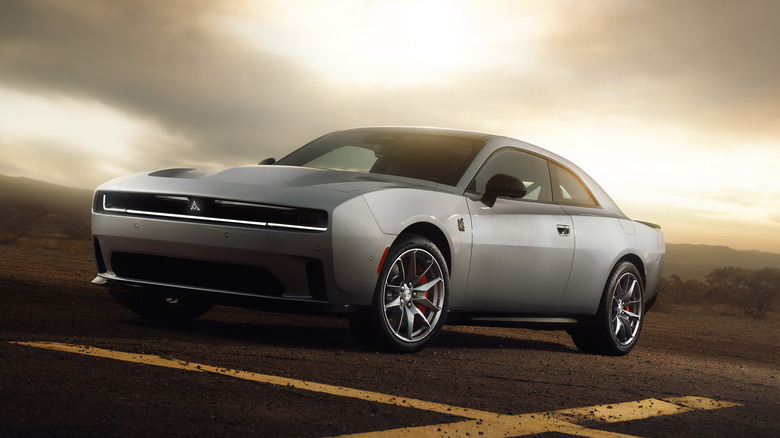Dodge Just Set The Bar For Muscle Car EVs
Today's electric vehicles have a diversity issue. Your average EV really only fits into one of three categories: SUV, luxury sedan, or truck. Dodge seemingly didn't want any part of that in revealing its new Dodge Charger Daytona EV today, which it is referring to as a muscle car. "Muscle car" as a category itself has a nebulous definition, but has historically referred to a V8-powered, American, rear-wheel drive, two-door car.
First, to clarify, the Dodge Charger Daytona — as unorthodox as it may seem for Dodge — is absolutely a muscle car. You may be immediately be thinking that, by making an EV, Dodge doesn't fit those core criteria. However, in the past, other cars that don't quite fit the mold have been inaugurated into muscle car stardom. In the 1980s, the Buick Grand National and GNX reached legendary American muscle status, even with "only" a V6 under the hood. Later, the previous generation Dodge Charger — a four door sedan — gave the automotive world new parameters for absolutely egregious amounts of power with its Hellcat variants.
With 670 horsepower in Scat Pack form, the new Charger Daytona definitely has some muscle, and the Dodge badge on the front should clue you into its national allegiances (even though it's built in Canada). Yes, it's as much a muscle car as the original 1966 Dodge Charger was.
It's not made for efficiency
With that out of the way, Dodge has done something different from other "legacy" automakers who started making EVs (which means Ford and General Motors, for the most part): It made an electric vehicle for the express purpose of goofing around. The Charger Daytona may be relatively efficient, with a maximum range of 317 miles, and it may be practical, especially the sedan which will follow on in 2025. But the sole reason for the Dodge Charger Daytona to exist seems to be burning tires, not to mention showing stalwart gasoline aficionados that it's entirely possible to have fun in an electric car.
A $135k Tesla Model S Plaid justifies its price tag by pretty much being the dictionary definition of "quick." It can reach 60 miles per hour in the neighborhood of 1.9 to 2 seconds, making it one of the fastest accelerating consumer cars on the planet. However, Tesla made the Model S as a luxury daily driver, not a performance car. It's like an investment banker who happened to be a track and field star. The Dodge Charger EV was made to be an NFL linebacker right off the bat.
A tough act to follow
Whether you like it or not, Dodge has invented a segment with the Charger Daytona. If the automaker can get all of its ducks in a row and move its muscle EV into customer's driveways, then its rivals will have a tough act to follow. As of now, GM and Ford do not have any pure-performance oriented EVs even announced, much less approaching the market.
Ford's EV treatment of perhaps the most famous American car of all time, the Mustang, is the excellent Mustang Mach-E, a four-door crossover that only vaguely looks like a Mustang. General Motors only occasionally acknowledges the existence of the Camaro, since it doesn't have Ultium in the name.
For the rest of the American EV makers, this sort of throwback futurism just doesn't fit within their modus operandi. It's hard to imagine Rivian making anything that isn't a high-end truck or SUV in the vein of the R1T electric pickup, much less a muscle car. Tesla is too busy being Tesla — flirting with weird pickup trucks and supercomputers – to care what the rest of the market is doing. It's safe to say Tesla may have enough challenges with image and press relations right now, to worry about making a Charger Daytona competitor.
Luring in a new generation of muscle car fans
If Dodge's handling of the Charger and Challenger are any indication of its ability to understand an audience, Dodge shouldn't have a lot of difficulty selling the Charger Daytona. It's primed to appeal to a new generation of automotive fans, whose only exposure to fast cars comes from watching a Tesla accelerate.
The hardcore muscle car fans who have the words "Numbers matching" and the phrase "no tire kickers, no low-ballers, I know what I have" forever part of their lexicon might not immediately hop onboard the new electric muscle car. They get the internal-combustion Dodge Charger Sixpack, and the knowledge that they intentionally picked the lesser-powered car.
Muscle cars don't need to have a huge and inefficient V8 to be cool, and electric cars don't have to look sterile and sedate. The Charger Daytona will (hopefully) allow EV automakers in the future to grow a mullet, rip off the sleeves of their Iron Maiden t-shirt, and have even a single ounce of fun. With the introduction of the Charger Daytona, the ball is firmly in the other brands' courts.



